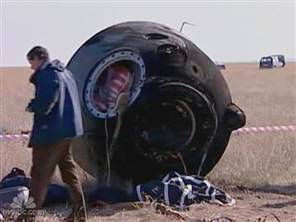[/caption]
Russia may have to delay the launch of the next crew to the International Space Station, as the descent module of the Soyuz spacecraft experienced an air leak during testing. The next crew of three for the space station had been scheduled to launch on March 30, 2012. Russia’s news agency Itar-Tass quoted Russian space agency (Roscosmos) official Alexei Krasnov, saying the Soyuz TMA–04M experienced problems during a test in an altitude test chamber at the Energia Space Rocket Corporation. Krasnov said no final decisions have been made yet on whether a delay will be necessary, but other sources indicated it could be delayed for several weeks.
Krasnov downplayed the seriousness of the failure, indicating the problems are related to a service element, rather than the descent capsule itself.
But earlier reports sounded more dire. “This descent vehicle can no longer be used in a manned flight,” said an unnamed source in an article in RIA Novosti. “Therefore the launch of the Soyuz TMA-04M will have to be rescheduled until the second half of April or the first half of May.”
The three ISS crewmembers scheduled to launch for Expedition 31 are Russians Gennady Padakla and Sergei Rivin and NASA astronaut Joseph Acaba, who will be replacing Expedition 30 crewmates Anton Shkaplerov, Anatoli Ivanishin and Dan Burbank, who arrived at the station in November, 2011.
The three Expedition 30 crew were initially scheduled to return to Earth on March 16, but since their own launch was delayed, their Soyuz craft does have some margin before exceeding its on-orbit certified life, and depending on the outcome of the inspection of the TMA–04M, they would be able to stay a few weeks longer.
The potential delay follows a series of technical mishaps for Roscomos during the past few months. In August of 2011 a Progress re-supply ship crashed back to Earth after the second stage of the rocket failed to ignite. In November, the Phobos-Grunt mission to Mars moon Phobos also experienced rocket failure and it ultimately disintegrated during re-entry to Earth’s atmosphere. In December, a Soyuz-2 rocket carrying a communications satellite failed shortly after launch from the Plesetsk spaceport.


Just another reason why the US should properly fund CCDev. Yet another example of poor quality workmanship from the ailing Russian space industry. But at least it was a test and not in-flight.
From what I have seen the US is withdrawing from manned space flight. As with all other things they would prefer to allow private enterprise to take over.
Private enterprise takeover will also mean that those companies will not publish the data they gather publicly.
Sure glad we dropped the shuttle; aren’t you???
Yeah, the Shuttle never failed on re-entry. We knew exactly how to test it before a mission to ensure it would perform well.
Without funding the Shuttle, we can afford to develop something safer.
Unfortunately, it seems that someone in Russia thinks the reduced competition means they can sell an inferior product.